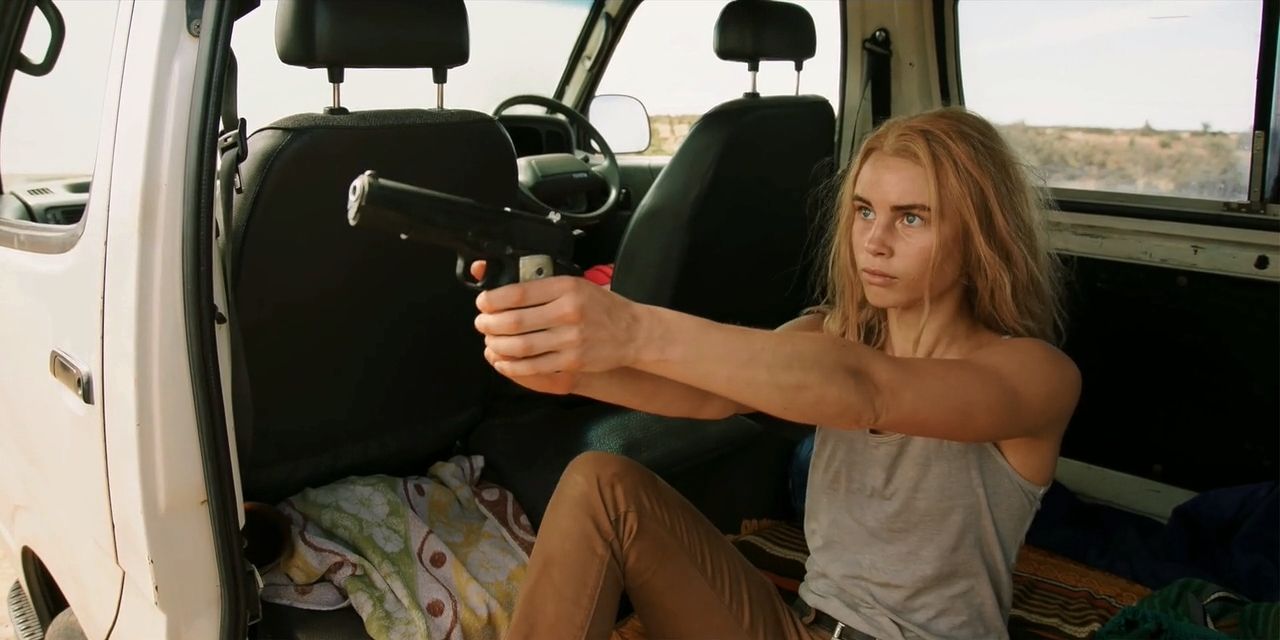 ★★★★
★★★★
“The dark side of Crocodile Dundee.”
 Here is a confession: I have never seen the acclaimed two Wolf Creek movies (2005 and 2013 – a third movie is planned). The reason was simple: I just didn’t care for ultra-cruel slashers from Australia. After watching this TV-spin off I might revise my opinion and catch up with them; if they are as good as this TV series I definitely want to see them!
Here is a confession: I have never seen the acclaimed two Wolf Creek movies (2005 and 2013 – a third movie is planned). The reason was simple: I just didn’t care for ultra-cruel slashers from Australia. After watching this TV-spin off I might revise my opinion and catch up with them; if they are as good as this TV series I definitely want to see them!
So, what’s the story? The American Thorogood family is on holiday in Australia. Unfortunately for them, their young son is swimming in a crocodile-infested lake (who goes swimming in Australia? Don’t we all know their waters are full of deadly animals?). Fortunately for them, Australian animal hunter Mick Taylor (John Jarratt) arrives, right on time, to shoot the crocodile before it can attack the boy. Unfortunately for them, Mick is a psychopathic sadistic serial killer who kills them all before the evening is over, including daughter Eve (Lucy Fry). Or so he thinks, because Eve survives. As she is slowly nursed back to health, and answers the questions of the police, she comes to the realization that the authorities won’t be able or willing to catch the killer.
She decides to hunt Mick herself and take revenge for the death of her family. Eve is originally innocent, and carries feelings of guilt, since her family was only in Australia because she was recovering from drug addiction – she used to be an athlete. She has to learn to get along in a hard, merciless country by herself, and avoid or defeat the criminals, thieves and would-be-rapists there who pose a threat during her journey. Eve is pursued by the police, as she herself has broken the law, and also by a well-meaning policeman who wants to help her. Not to mention Mick who – happily slashing his way through unpopulated areas – has realized that someone is pursuing him and starts to play a cat-and-mouse-game with Eve…
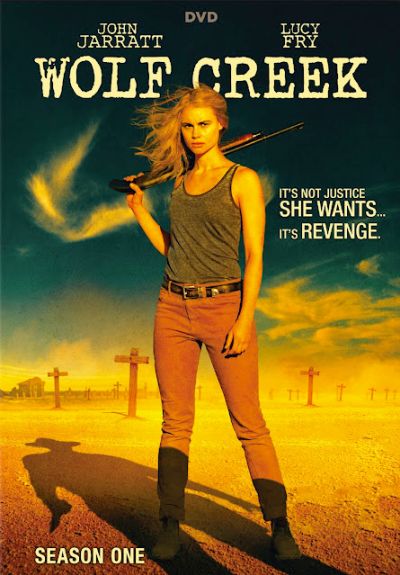 I have to say that this series really surprised me. I had bought it based solely due to the cool cover photo and didn’t expect much more than a probably over-gruesome third-rate slasher, I mean, is Australia really famous for great serial killer psycho thrillers? Though there is the very good Stacy Keach and Jamie Lee Curtis thriller from 1981, Road Games. As a matter of fact, this short (six episodes) series blew me away with its astounding quality. When you read the above, you might be forgiven for getting the impression the whole thing will come across as a bit cheap in its storytelling, or the motivation of its characters – a bit schlocky in general.
I have to say that this series really surprised me. I had bought it based solely due to the cool cover photo and didn’t expect much more than a probably over-gruesome third-rate slasher, I mean, is Australia really famous for great serial killer psycho thrillers? Though there is the very good Stacy Keach and Jamie Lee Curtis thriller from 1981, Road Games. As a matter of fact, this short (six episodes) series blew me away with its astounding quality. When you read the above, you might be forgiven for getting the impression the whole thing will come across as a bit cheap in its storytelling, or the motivation of its characters – a bit schlocky in general.
But… it isn’t.
The best way I can describe the show is with the word “unpretentious”. That might sound strange. Yes, it is, at its core, a revenge story. And, yes, people are tortured and killed in cruel ways: when someone has an infected hand, you see him cut it off with a saw. But I never got the feeling these scenes were gratuitous or to make the blood-thirsty gorehounds happy. Quite the opposite: things like this are carefully integrated into the narrative of the story, and have a meaning that goes above mere shock value. I would almost call this story, about a serial killer tracking his prey across desert hunting grounds, decent and yes, even tasteful – considering how different this narrative could have been presented.
Most surprising for me was, though big game hunter Mick is always looming in the background, it’s mainly Eve’s story. In the beginning I wasn’t too impressed with her. She seemed like a bland, pale character, just a victim who survived a catastrophe. I was half expecting her to become the usual superwoman, who knows it all and can do everything better than every male – thanks, mister! But the filmmakers were smarter than your average Hollywood screenwriter and producer, who nowadays seem only to be able to create one-dimensional, flawless, conveyor-belt manufactured heroines. Eve does not know it all, she can not do it all alone, and makes mistakes – some really terrible. She fails and learns from it. She falls and has to stand up again. It alone makes the character better than almost 95% of today’s female protagonists in American movies or shows. Kudos for that!
Also, there is a second season, which I have not seen yet (it isn’t available in my home country). Given it has everyone’s favourite killer from Down Under again, but not Eve, I began seriously to worry about her fate. You really start to sympathize with her. Running away from the police in the beginning might be anything but rational, but as the series develops, so does she. You start to understand who she is, and she gets a backstory: she is not a random female character out for revenge anymore. She has these understandable feelings and more than once I thought: “Gosh, this could be going different, girl. You should be working together with the police. There could be common ground if you were not so stuck on the idea that you’ve got to do this all on your own!”
Then there are moments when she realizes herself she is way over her head, fighting insurmountable odds. She gets better at it, slowly, and the point in a way is about self-discovery. It becomes an odyssey for oneself, where the protagonist has to question when reaching the nadir of life: What am I standing for? Why do I do what I do? Is it really worth all that? Could I choose a different life? There are moments that indicate that Eve might give up her hunt. The series repeatedly contrasts her persona with other characters who have lost themselves, who may have been destroyed by this vast open country where you seem to be far from civilization or God.
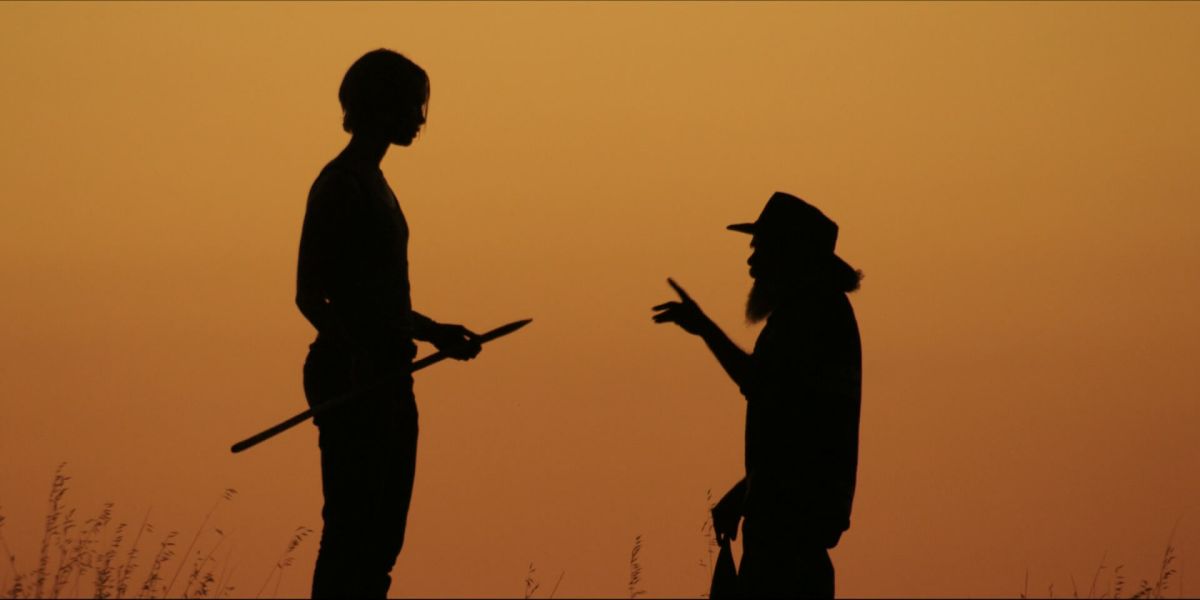 Eve is repeatedly confronted by these criminals, or wanna-be-rapists who see a normal dressed woman as an offer, and experiences family tragedies that actually form the core of the narrative. She is not without help though. As well as the policeman on her trail who reluctantly starts to cover-up for her, there is a criminal whom she meets in the desert, an old Aborigine who fits into the classic mentor role, a colleague in a bar and she even gets a canine companion. Though the question always lingers while watching the show: Will she get her revenge? What will she do when meeting the man who killed her family? Does she even have a chance against an experienced, sadistic killer like Mick?
Eve is repeatedly confronted by these criminals, or wanna-be-rapists who see a normal dressed woman as an offer, and experiences family tragedies that actually form the core of the narrative. She is not without help though. As well as the policeman on her trail who reluctantly starts to cover-up for her, there is a criminal whom she meets in the desert, an old Aborigine who fits into the classic mentor role, a colleague in a bar and she even gets a canine companion. Though the question always lingers while watching the show: Will she get her revenge? What will she do when meeting the man who killed her family? Does she even have a chance against an experienced, sadistic killer like Mick?
So, yes, I applaud Lucy Fry’s performance in the role. Thanks to an excellent script, it made me believe she – albeit slowly- becomes a potential threat to the seasoned serial killer. But also John Jarrat, playing this role for a third time, is incredibly good. Mick Taylor is a nightmare of a character, superficially charming, but essentially a disgusting sleazebag. Though it’s great even he has been given a backstory. While he kills the way other people drink their morning coffee, we get to know enough about him to deduce how he became that way. An episode tells us in flashback about a key event in his childhood that may have been the catalyst for his murderous doings. If this is believable is up to the viewer, I think. I like it they gave him more than the “Well, he’s insane” explanation so many movies and shows tend to give their killers nowadays.
Having Eve faced with what can only be labelled as a devil in human form, touches an even more ambitious question. It’s a theme that classic The Hitcher (C. Thomas Howell and Rutger Hauer) dared to ask. How much of your own humanity do you have to leave behind, to be able to fight the devil? I think it refers to the age-old Nietzsche-ism “If you gaze long enough into an abyss, the abyss will gaze back into you.” I’m not saying how this “psycho thriller” ends, but I really, really recommend this show. Every episode had me glued to my TV, and I got much more enjoyment out of this short Australian TV show than I imagined. Also, I think it’s far superior to your average American product playing in the same genre pool.
I really feel I should get my hands on season 2, even though the main actress won’t be back. Also, I look forward to the third movie – and I wish you happy hunting! 😉
Creator: Greg McLean
Star: Lucy Fry, John Jarratt, Dustin Clare, Jessica Tovey
 The palpable sense of disappointment I felt when the end credits rolled, was all the more striking, given the decent way this opened. Ayse (Koç) is enjoying a shower after some afternoon delight with her lover, when there’s a thunderous knocking on the door. It’s her thoroughly disgruntled ex-husband. In the resulting fracas, the boyfriend is shot dead, and Ayse has to leap out of a window, and go on the run. Friends and family disown her, as the ancient concept of the honour killing still holds sway in contemporary Turkey. She can’t even go to the authorities, since the ex-husband is a policeman.
The palpable sense of disappointment I felt when the end credits rolled, was all the more striking, given the decent way this opened. Ayse (Koç) is enjoying a shower after some afternoon delight with her lover, when there’s a thunderous knocking on the door. It’s her thoroughly disgruntled ex-husband. In the resulting fracas, the boyfriend is shot dead, and Ayse has to leap out of a window, and go on the run. Friends and family disown her, as the ancient concept of the honour killing still holds sway in contemporary Turkey. She can’t even go to the authorities, since the ex-husband is a policeman. 




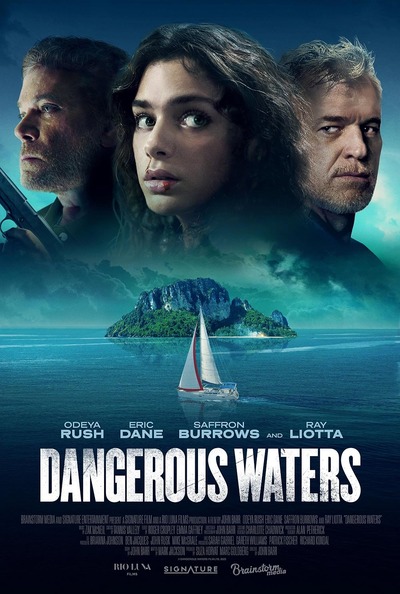 This was Ray Liotta’s last movie: he died during shooting. Cruel though it may be, I can’t help wondering if he died of embarrassment. Certainly, I note that his character never gets a proper send-off: while I must remain vague for spoiler purposes, you don’t see his face. Not that he’s in this much. A rambling conversation with the heroine is the bulk of it. But that’s getting ahead of ourselves. We begin with single mom Alma (Burrows) dragging unwilling teen daughter Rose (Rush) on a sailing trip from Florida to Barbados. The boat belongs to her new boyfriend, ex-cop Derek (Dane), and at first, things are pleasant, despite Rose’s obvious desire to be anywhere else but on the high seas.
This was Ray Liotta’s last movie: he died during shooting. Cruel though it may be, I can’t help wondering if he died of embarrassment. Certainly, I note that his character never gets a proper send-off: while I must remain vague for spoiler purposes, you don’t see his face. Not that he’s in this much. A rambling conversation with the heroine is the bulk of it. But that’s getting ahead of ourselves. We begin with single mom Alma (Burrows) dragging unwilling teen daughter Rose (Rush) on a sailing trip from Florida to Barbados. The boat belongs to her new boyfriend, ex-cop Derek (Dane), and at first, things are pleasant, despite Rose’s obvious desire to be anywhere else but on the high seas.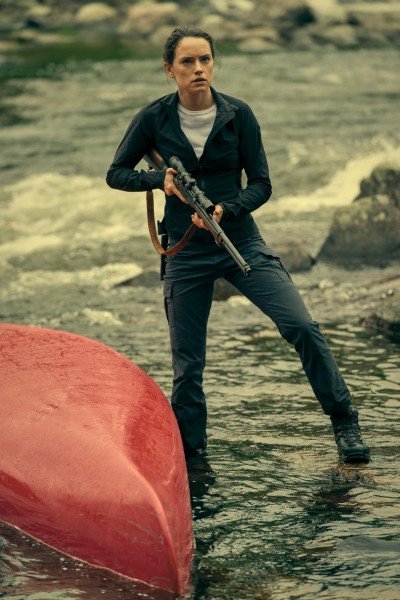 This begins with the young Helena, living deep in the woods with her mother and father, Jacob (Mendelsohn). He’s teaching her the ways of the forest, including hunting and the need to be ruthless, with the top priority expressed in the tagline above. However, things aren’t quite what they seem: it feels like it could be a century ago, yet the tranquil illusion is shattered when a lost stranger on an ATV rides up. Mom makes a break for freedom with Helena, for it seems this is actually a kidnapping which has gone on for a long time. Fast forward twenty years: Jacob is in prison, mom killed herself and Helena (Ridley) is working a dead-end job, but married to Stephen (Hedlund), and with a daughter, Marigold.
This begins with the young Helena, living deep in the woods with her mother and father, Jacob (Mendelsohn). He’s teaching her the ways of the forest, including hunting and the need to be ruthless, with the top priority expressed in the tagline above. However, things aren’t quite what they seem: it feels like it could be a century ago, yet the tranquil illusion is shattered when a lost stranger on an ATV rides up. Mom makes a break for freedom with Helena, for it seems this is actually a kidnapping which has gone on for a long time. Fast forward twenty years: Jacob is in prison, mom killed herself and Helena (Ridley) is working a dead-end job, but married to Stephen (Hedlund), and with a daughter, Marigold.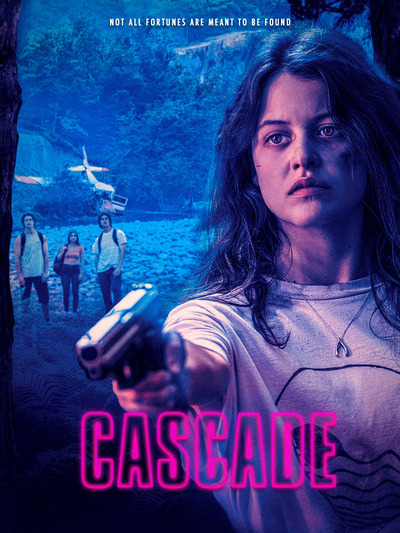 It’s kinda interesting to compare this to
It’s kinda interesting to compare this to 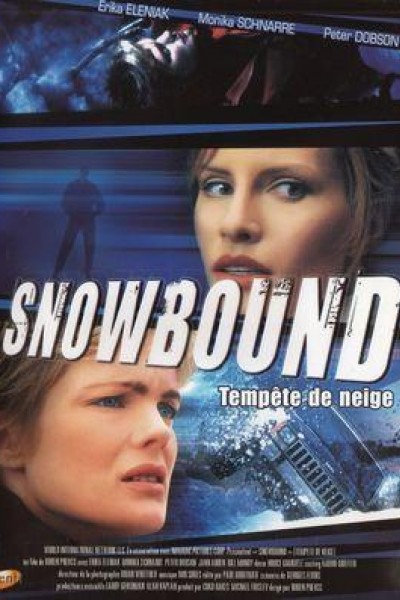 Though not formally listed on the IMDb as a made for television movie, it has all the hallmarks of one, down to what look suspiciously like pauses into which commercial breaks could be inserted. It’s the story of work colleagues, Liz Bartlett (Schnarre) and Barbara Tate (Eleniak). The former is attacked in the company’s parking garage one night, and confesses to her friend that her former husband is stalking her. She fears for her life, having helped put him behind bars. So what is the most sensible thing for the pair to do in these circumstances? If your answer is, “Head off to a remote mountain cabin, in the middle on an impending blizzard”, give yourself two points.
Though not formally listed on the IMDb as a made for television movie, it has all the hallmarks of one, down to what look suspiciously like pauses into which commercial breaks could be inserted. It’s the story of work colleagues, Liz Bartlett (Schnarre) and Barbara Tate (Eleniak). The former is attacked in the company’s parking garage one night, and confesses to her friend that her former husband is stalking her. She fears for her life, having helped put him behind bars. So what is the most sensible thing for the pair to do in these circumstances? If your answer is, “Head off to a remote mountain cabin, in the middle on an impending blizzard”, give yourself two points.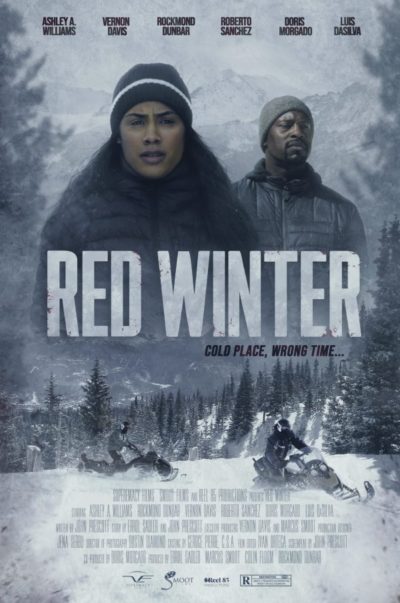 Carla (Williams) and her boyfriend Daniel (Davis) are all set for a nice weekend in the mountains. Unfortunately, the snowmobile trip runs into difficulty, in particular coming in the shape of a pair of cartel assassins. What, you may ask, are a pair of cartel assassins doing half-way up a snowy mountain in [I’m guessing] the Colorado Rockies? Good question. I’m glad you asked. They are after a robber who made the ill-advised decision to rob a bar which was a front for their organization. He’s now hiding out, half-way up the aforementioned snowy mountain, in the belief he’s safe. Turns out not to be the case.
Carla (Williams) and her boyfriend Daniel (Davis) are all set for a nice weekend in the mountains. Unfortunately, the snowmobile trip runs into difficulty, in particular coming in the shape of a pair of cartel assassins. What, you may ask, are a pair of cartel assassins doing half-way up a snowy mountain in [I’m guessing] the Colorado Rockies? Good question. I’m glad you asked. They are after a robber who made the ill-advised decision to rob a bar which was a front for their organization. He’s now hiding out, half-way up the aforementioned snowy mountain, in the belief he’s safe. Turns out not to be the case.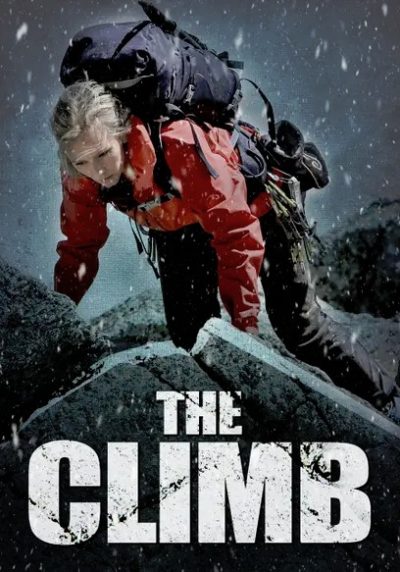 I was really surprised to discover that this French film is actually made for television. It has a certain gravitas and thoughtfulness to it, that you rarely find in a genre which is (often rightfully) derided as being formulaic and cliched. This doesn’t escape those criticisms entirely – in particular, there’s a “Disease of the Week” subplot, which does feel as it it might have strayed in from Lifetime or Hallmark. However, even there, it feels handled in a relatively natural manner, rather than being shoehorned in there to elicit sympathy from the viewer. It definitely looks better than most TVMs out of Hollywood. Whether this is down to Félix von Muralt’s cinematography, or simply the stunning Alpine landscapes, is open to debate.
I was really surprised to discover that this French film is actually made for television. It has a certain gravitas and thoughtfulness to it, that you rarely find in a genre which is (often rightfully) derided as being formulaic and cliched. This doesn’t escape those criticisms entirely – in particular, there’s a “Disease of the Week” subplot, which does feel as it it might have strayed in from Lifetime or Hallmark. However, even there, it feels handled in a relatively natural manner, rather than being shoehorned in there to elicit sympathy from the viewer. It definitely looks better than most TVMs out of Hollywood. Whether this is down to Félix von Muralt’s cinematography, or simply the stunning Alpine landscapes, is open to debate.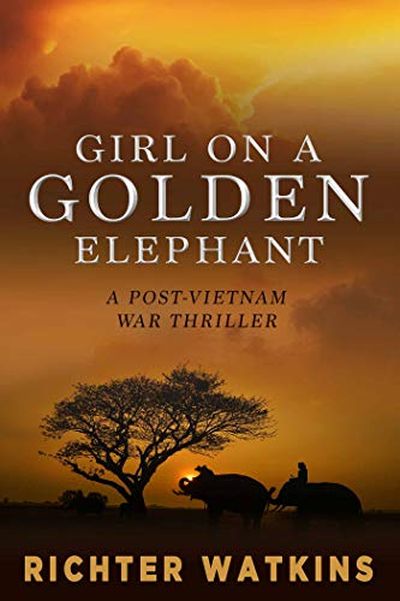 War correspondent
War correspondent  ★★★★
★★★★ Here is a confession: I have never seen the acclaimed two Wolf Creek movies (2005 and 2013 – a third movie is planned). The reason was simple: I just didn’t care for ultra-cruel slashers from Australia. After watching this TV-spin off I might revise my opinion and catch up with them; if they are as good as this TV series I definitely want to see them!
Here is a confession: I have never seen the acclaimed two Wolf Creek movies (2005 and 2013 – a third movie is planned). The reason was simple: I just didn’t care for ultra-cruel slashers from Australia. After watching this TV-spin off I might revise my opinion and catch up with them; if they are as good as this TV series I definitely want to see them! I have to say that this series really surprised me. I had bought it based solely due to the cool cover photo and didn’t expect much more than a probably over-gruesome third-rate slasher, I mean, is Australia really famous for great serial killer psycho thrillers? Though there is the very good Stacy Keach and Jamie Lee Curtis thriller from 1981, Road Games. As a matter of fact, this short (six episodes) series blew me away with its astounding quality. When you read the above, you might be forgiven for getting the impression the whole thing will come across as a bit cheap in its storytelling, or the motivation of its characters – a bit schlocky in general.
I have to say that this series really surprised me. I had bought it based solely due to the cool cover photo and didn’t expect much more than a probably over-gruesome third-rate slasher, I mean, is Australia really famous for great serial killer psycho thrillers? Though there is the very good Stacy Keach and Jamie Lee Curtis thriller from 1981, Road Games. As a matter of fact, this short (six episodes) series blew me away with its astounding quality. When you read the above, you might be forgiven for getting the impression the whole thing will come across as a bit cheap in its storytelling, or the motivation of its characters – a bit schlocky in general. Eve is repeatedly confronted by these criminals, or wanna-be-rapists who see a normal dressed woman as an offer, and experiences family tragedies that actually form the core of the narrative. She is not without help though. As well as the policeman on her trail who reluctantly starts to cover-up for her, there is a criminal whom she meets in the desert, an old Aborigine who fits into the classic mentor role, a colleague in a bar and she even gets a canine companion. Though the question always lingers while watching the show: Will she get her revenge? What will she do when meeting the man who killed her family? Does she even have a chance against an experienced, sadistic killer like Mick?
Eve is repeatedly confronted by these criminals, or wanna-be-rapists who see a normal dressed woman as an offer, and experiences family tragedies that actually form the core of the narrative. She is not without help though. As well as the policeman on her trail who reluctantly starts to cover-up for her, there is a criminal whom she meets in the desert, an old Aborigine who fits into the classic mentor role, a colleague in a bar and she even gets a canine companion. Though the question always lingers while watching the show: Will she get her revenge? What will she do when meeting the man who killed her family? Does she even have a chance against an experienced, sadistic killer like Mick?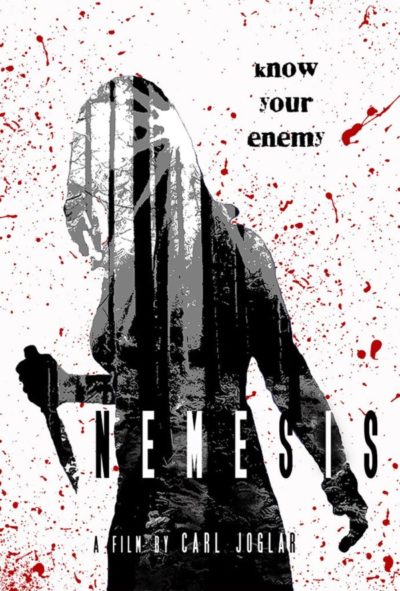 I was going to go with “Tree’s company” as the tagline, before I realized I’ve actually used that in three separate, forest-set movies. So I decided to adjust it slightly, and what’s above is indeed very apt. There is a cast of three (3) and the entire thing unfolds in the woods. There isn’t a single set or interior shot in the whole film. Indeed, if you’d asked me, I’d have said this had all the hallmarks of a COVID-era project, designed to be shot with a small cast and in a nicely sanitary, outdoor location. Not so, even though Tubi dates it as 2020. There was a screening in April 2019, well before anyone had heard of Wuhan, and the IMDb gives it a year of 2017.
I was going to go with “Tree’s company” as the tagline, before I realized I’ve actually used that in three separate, forest-set movies. So I decided to adjust it slightly, and what’s above is indeed very apt. There is a cast of three (3) and the entire thing unfolds in the woods. There isn’t a single set or interior shot in the whole film. Indeed, if you’d asked me, I’d have said this had all the hallmarks of a COVID-era project, designed to be shot with a small cast and in a nicely sanitary, outdoor location. Not so, even though Tubi dates it as 2020. There was a screening in April 2019, well before anyone had heard of Wuhan, and the IMDb gives it a year of 2017.